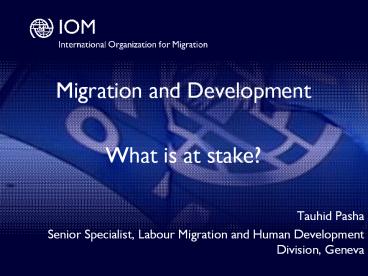Migration and Development - PowerPoint PPT Presentation
Title:
Migration and Development
Description:
Title: PowerPoint Presentation Author: E. NOVRUZOVA Last modified by: PASHA Tauhid Created Date: 9/1/2004 2:41:56 PM Document presentation format – PowerPoint PPT presentation
Number of Views:136
Avg rating:3.0/5.0
Title: Migration and Development
1
- Migration and Development
- What is at stake?
- Tauhid Pasha
- Senior Specialist, Labour Migration and Human
Development Division, Geneva
2
IOM and migration development (MD)
- Making migration work for sustainable
development for migrants, countries of origin and
countries of destination
3
MD what is at stake?
- Migration matters today more than ever before
- Migration is relevant to all three pillars of
sustainable development - Governments increasingly recognize that migration
is both inevitable and necessary and that it can
contribute to inclusive and sustainable social
and economic development
4
Effects of migration on development
- Migration is relevant to the
- economic,
- social and
- environmental dimensions of sustainable
development and to - peace and security.
5
Migration dynamics
1 billion Migrants
7 billion Population
232 million International 740 million
Internal
Feminization ca. 50
6
International Migrants in Context
Population Between 4th and 5th Largest Countries
Economic Contribution Size of Large GDPs
7
IV. Key findings Comparing four pathways of
migration
Most international migrants move from the South
to the North or between countries in the South
8
More than half of the top 20 migration corridors
are accounted for by people migrating from South
to South
Top 20 migration corridors worldwide (migrant
stock, in thousands), using the World Bank
classification, 2010
Source IOM calculations, based on UN DESA, 2012b.
Source IOM calculations, based on UN DESA,
2012b.
9
Migration trends in EECA
- While migrant stocks in the region seem to have
been stabilizing - other types of human mobility emerge (e.g.
student mobility)
International migrant stock, 1990 - 2013
Outbound mobile students, 2011
Source UN DESA, 2013, graph generated by IOM RO
Vienna
Source UNESCO, 2011
10
Remittances inflows in EECA, 2012
- Considerable impact of remittances inflows on 5
EECA countries (above 10 of GDP)
Source World Bank, Oct. 2013, graph generated by
IOM RO Vienna
11
Post 2015 development agenda
- 2015 deadline for achievement of millennium
development goals - Safe orderly migration development gains
- Forced or unplanned migration negative
repercussions for human development
12
Migration as an enabler of development
13
Improving development outcomes
- Promoting the integration of migration within
development processes at national/regional/global
levels. - Protecting promoting the human rights of all
migrants including undocumented, stranded,
stateless or otherwise vulnerable migrants. - Supporting inter-State, multi-stakeholder
consultation and cooperation on migration,
especially by providing knowledge and expertise
14
Effective approaches
- Mainstreaming migration into development
processes. - Development at a local level.
- Diaspora engagement
- Ethical recruitment standards
15
HLD Round Table RecommendationsAssessing the
effects of international migration on sustainable
development and identifying relevant priorities
in view of the preparations of the post-2015
development framework
- Include migration in the post-2015 UN Development
Agenda as part of a new global partnership for
development and/or as a cross-cutting enabler - Mainstream migration into development and broader
sectoral planning especially labour market
policy, health and human rights protection at
local, national and global levels and both in
developing and developed countries. - Embark on an inclusive process of mainstreaming
migration into development and other policy
sectors, with participation by all relevant
ministries and government agencies, civil
society, academia, and diaspora organizations
led by designated institutions or coordination
bodies equipped with the necessary capacities. - Raise the quality of research and data collection
on migration and invest in more systematic
evaluation and impact assessments of migration
policies and migration and development
initiatives, including through comparable
indicators and data on migration, and on the
nexus between migration and development.
16
- Thank you

